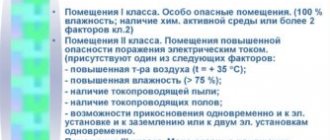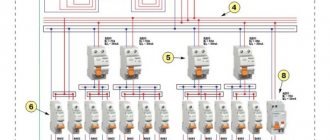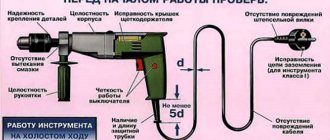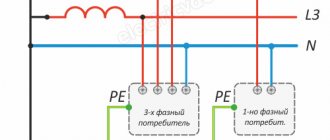Electrical safety approval groups
GROUP 2: assigned to electricians who have worked at a given installation for at least one month (trainees do not need experience) and a minimum of electrical knowledge, as well as clearly present the dangers of electric shock and know the basic precautions when operating electrical installations.
GROUP 3: assigned upon reaching the age of 18 to electricians with secondary education with a total work experience of at least three months and who have worked for two of them, having group II. In addition to electrical knowledge and a clear understanding of electrical hazards, safety precautions, and first aid, Group III employees must be familiar with those sections of the Safety Rules that apply to their responsibilities.
In addition, they must be able to supervise the safety of work in electrical installations.
GROUP 4: it is necessary to have secondary education and work experience of at least three months, and for those who graduated from vocational schools - at least two months in the previous group. In addition to the knowledge necessary to assign Group III, to obtain Group IV you must know the Safety Rules and be able to freely understand all the elements of a given electrical installation, as well as be able to organize and teach the safe conduct of work in electrical installations.
GROUP V: assigned to foremen, technicians and engineers with completed education and with work experience in the previous group of at least three months, as well as foremen and practitioners holding engineering positions with work experience in the previous group of at least two years. To obtain qualification group V, you must have not only the knowledge necessary to assign group IV and knowledge of the Safety Rules, but also a clear understanding of what causes the requirements of each paragraph of the rules, as well as be able to organize the safe performance of a set of works and supervise them during any voltage.
What requirements must holders meet?
Certification of electrical safety in Rostekhnadzor of electrical personnel
Personnel with third-level security access must have basic knowledge of general electrical equipment and must be aware of the structure and operating principles of electrical equipment and devices with voltages not exceeding one thousand volts. The specialist must also know how to supervise work on electrical equipment and be able to provide first aid.
Note! Most of all the requirements relate to security issues.
It is assumed that the specialist is already familiar with the basic electrical machines and devices and knows the principles of their operation.
Obtaining a new group occurs sequentially. Only employees with the second category can receive the third one. There is also an annual confirmation of qualifications, which is entered into the logbook.
The resulting group does not depend on the employee’s place of work. He has the right to change his place of work while maintaining his qualifications.
In case of untimely confirmation of skills within a year, the specialist loses his category and cannot continue to work with electrical installations until he confirms his skills. If there is no confirmation for three years, the employee’s qualifications are automatically dropped to the second group. After this, he needs to start the entire promotion process from the beginning.
Receipt procedure
Cost of electrical safety certification
| № p/p | Direction | Cost of certification*and**, rub. |
| 1 | II, III, IV tolerance group up to 1000V according to PTEEP, POT (for electricity consumers), without special. works | from 3 500 |
| 2 | III, IV, V tolerance group up to and above 1000V according to PTEEP, POT (for electricity consumers), without special. works | from 4 000 |
| 3 | III, IV tolerance group up to 1000V according to PTEEP, POT (for electricity consumers), with special. works | from 4 000 |
| 4 | III, IV, V tolerance group up to and above 1000V according to PTEEP, POT (for electricity consumers), with special. works | from 4 500 |
| 5 | IV tolerance group up to 1000V according to PTEEP, POT, with the right to inspect electrical equipment (for Health and Safety Specialists) | from 3 500 |
| 6 | V tolerance group up to and above 1000V according to the PRP in OEE, POT (for electric power facilities: stations and networks), without special. works | from 14 500 |
| 7 | V tolerance group up to and above 1000V according to the PRP in OEE, POT (for electric power facilities: stations and networks), with special. works | from 20 500 |
*Please note that this offer is for informational purposes only and under no circumstances constitutes a public offer. The final cost of the service is determined upon conclusion of the contract.
**The indicated cost depends on the regional affiliation of the company and the number of certified persons, and is formed on the basis of the submitted application.
Our center staff will answer all your questions.
Type of electrical safety personnel
Electrical staff
- directly organizing and carrying out work on servicing existing electrical installations or performing adjustment, electrical installation, repair work or preventive tests in them, as well as personnel who have the right to issue orders, orders, and conduct operational negotiations:
- administrative and technical personnel - specialists and managers responsible for organizing operational and technical maintenance, carrying out installation, repair and adjustment work in existing electrical installations;
- operational personnel - necessary to carry out operational maintenance of existing electrical installations (carrying out operational switching, inspections, preparing the work site, access to work and supervision during work on them);
- maintenance personnel carry out maintenance and various types of repairs of electrical equipment, as well as carry out its installation, adjustment and testing;
- operational and repair personnel are specialists who have completed a special training course in servicing the electrical equipment assigned to them.
Who needs training?
The following are faced with the need to undergo training for group 3 electrical safety clearance:
- employees who work with electrical equipment;
- managers and specialists who organize work related to electrical engineering;
- technicians who install, repair and maintain electrical equipment.
Employees who have left their previous place of work are also required to undergo Group 3 electrical safety training again: in this case, the certificate becomes invalid. The employer is obliged to organize certification for newly hired employees. He is given a month to do this.
Electrotechnological personnel perform the following work:
- According to PTEEP clause 1.4.3: work on servicing electrical technological installations (electric welding, electrolysis, electric furnaces, etc.) and their adjustment; operation of hand-held electrical machines, portable and mobile power receivers, portable power tools.
- According to POT: control of a technological process, the main component of which is electrical energy (electric welding, electric arc furnaces, etc.); operation of portable power tools and lamps.
In their rights and responsibilities, electrical engineering personnel are equal to electrical engineering personnel and are technically subordinate to the organization’s energy service.
Electrical and electrical engineering personnel are assigned groups from 2 to 4 (up to 1000V), 4 and 5 (up to and above 1000V), depending on their work experience in their specialty, education received, theoretical knowledge and practical skills.
For electrical personnel conducting special work, you must obtain permission for this type of work (in accordance with the technical regulations):
- work performed at a height of more than 5 m from the surface of the ground, ceiling or working floor, on which work is carried out directly from structures or equipment during their installation or repair with the mandatory use of fall protection equipment;
- work without removing the voltage from the electrical installation, performed with touching the primary live parts that are under operating voltage, or at a distance from these live parts that is less than permissible (hereinafter referred to as work under voltage on live parts);
- testing equipment with increased voltage (except for work with a megohmmeter);
- work performed by removing operating voltage from an electrical installation or part thereof with touching live parts that are under an induced voltage of more than 25 V in the workplace or at a distance from these live parts that is less than permissible (hereinafter referred to as work under induced voltage).
Non-electrical personnel
— this personnel includes specialists who do not fall under the definition of electrical engineering, that is, these are personnel who do not directly operate electrical installations, but who, in the course of performing their job duties, encounter electrical installations (office workers when working with a computer, etc.).
This personnel must have group I, which is assigned at the enterprise itself.
Requirements for specialists for electrical safety certification
| Group by electric security | Minimum work experience in electrical installations, months. | |||||
| Organization staff | Trainees | |||||
| without secondary education | with secondary education | with average electro technical and higher technical education | with higher electrical engineering. education | vocational schools | institutes and technical schools (colleges) | |
| II | After training in the program is not less than 72 hours | Not standardized | ||||
| III | 3 to IIgr | 2 to IIgr | 2 to IIgr | 1 on IIgr | 6 on IIgr | 3 on IIgr |
| IV | 6 to IIIgr | 3 to IIIgr | 3 to IIIgr | 2 on IIIgr | ||
| V | 24 to IVgr | 12 to IVgr | 6 to IVgr | 3 on IVgr | ||
Conditions for assigning group 3
In addition to mandatory training and certification activities, to obtain group 3 electrical safety clearance, a specialist must meet the following requirements:
- Availability of practical skills in the field of working with electrical equipment, including conducting instructions, providing emergency assistance to persons injured by electric current, etc.;
- Knowledge of safety requirements in related areas, including fire safety;
- Availability of a valid certificate of assignment of group 2 in electrical safety;
- Fulfillment of the requirements for the minimum permitted work experience in a specialty with group 2. For students with incomplete secondary education, admission can be granted after 3 months of work in the previous category; for students with secondary, secondary specialized and non-core higher education - 2 months. Workers with higher technical education group 3 can be assigned after 1 month of continuous work from the second.
Fulfillment of work experience requirements with a previous clearance must be supported by documents. The listener will need to provide a certificate with Group 2 in electrical safety, as well as a copy of the work book, which records information about the availability of relevant experience.
Teachers
Kalyagin Evgeniy Dmitrievich Education: Penza Mechanical Engineering College with a degree in Civil Engineer, Russian State University of Innovative Technologies and Entrepreneurship with a degree in Industrial Safety. After graduating from technical school. Evgeny Dmitrievich went to work at the Penza Iron Foundry as a foundry worker. He worked his way up from an ordinary worker to a workshop manager. During his career, he worked at almost ten large industrial enterprises in different regions of Russia. Has certification in the field of industrial safety A.1, B.7.1 and B.8.21. Since 2021, he has been collaborating with our center as an industrial safety expert.
Konovalov Igor Sergeevich Education: Moscow State Engineering University with a degree in Mechanical Engineering Technology. After graduating from university, he was assigned to ZATO “Strezhevoy” in the Tomsk region, where he worked at an oil refinery. He worked in this field for more than twenty years. He was a member of the commission to investigate industrial accidents. Has certification in areas B.1.2 and B.1.3. In 1996-1998 he worked as an inspector of scheduled inspections in the Altai Interregional Directorate of Rostechnadzor. He has been collaborating with our center as a freelance teacher since 2013.
Students who have successfully passed certification in electrical safety (3rd group on electrical safety up to 1000V) receive a certificate of advanced training for 72 hours.
Frequency of electrical safety certification
Primary knowledge test
It is carried out for workers who first entered a job related to the maintenance of electrical installations, or after a break in testing knowledge for more than 3 years.
Another check
must be carried out within the following time frames, depending on job responsibilities:
- for electrical personnel who directly organize and carry out maintenance work on existing electrical installations or perform adjustment, electrical installation, repair work or preventive tests in them. This also includes personnel who have the right to issue orders, orders, and conduct operational negotiations - once a year;
- for administrative and technical personnel who do not belong to the previous group, as well as for labor protection specialists authorized to inspect electrical installations - once every 3 years
Extraordinary inspection
carried out according to:
- Order of the Ministry of Energy of the Russian Federation No. 6 dated January 13, 2003 (clause 1.4.23.)
- when new or revised rules and regulations come into effect for the Consumer;
- when installing new equipment, reconstructing or changing the main electrical and technological circuits (the need for an extraordinary check in this case is determined by the technical manager);
- upon appointment or transfer to another job, if new responsibilities require additional knowledge of rules and regulations;
- at the request of state supervisory authorities;
- according to the conclusion of commissions investigating accidents with people or disruptions in the operation of an energy facility;
- if there is a break in work in this position for more than 6 months;
- in case of violation by employees of the requirements of regulations on labor protection;
- when testing knowledge after receiving an unsatisfactory grade;
- when increasing knowledge to a higher group.
- Resolution of the Ministry of Labor of the Russian Federation and the Ministry of Education of the Russian Federation No. 1/29 of January 13, 2003 (clause 3.3.).
- when introducing new or making changes and additions to existing legislative and other regulatory legal acts containing labor protection requirements. At the same time, knowledge of only these legislative and regulatory legal acts is tested;
- when commissioning new equipment and changes in technological processes that require additional knowledge on labor protection for workers. In this case, knowledge of labor protection requirements associated with the relevant changes is checked;
- when assigning or transferring employees to another job, if new duties require additional knowledge on labor protection (before they begin to perform their job duties);
- at the request of officials of the Federal Labor Inspectorate, other bodies of state supervision and control, as well as federal executive authorities and executive authorities of constituent entities of the Russian Federation in the field of labor protection, local government bodies, as well as the employer (or a person authorized by him) when establishing violations of the requirements labor protection and insufficient knowledge of occupational safety and health requirements;
- after accidents and incidents that have occurred, as well as when repeated violations by employees of the organization of the requirements of regulatory legal acts on labor protection are identified;
- if there is a break in work in this position for more than one year.
Obtaining electrical safety group 3 is required:
- employees working independently on electrical installations separately from the team;
- managers, labor protection specialists who organize work with electrical equipment and supervise personnel with qualification group 2;
- technical specialists whose competence includes installation, repair, maintenance, testing, commissioning of electrical equipment.
If the second group is assigned when hiring an electrician and gives the right to work only in the presence of a manager, then electricians and electricians who have received the third group have the right to independently perform work related to the operation of electrical installations. This is the level that employers are most often interested in when looking for electricians.
The list of positions requiring admission is determined by the person responsible for electrical equipment and approved by the manager. These are heads of departments, engineers, electricians, electricians, installers of low-current systems, and electromechanics.
Learning outcome
- a certificate and journal on testing knowledge of labor standards and work rules in electrical installations with a mark from an inspector of Rostechnadzor - for enterprises of electricity consumers;
- a certificate with a mark from a Rostechnadzor inspector and a Rostechnadzor protocol - for energy supply enterprises (power plants, electrical networks).









